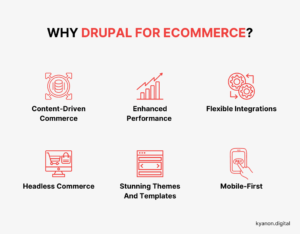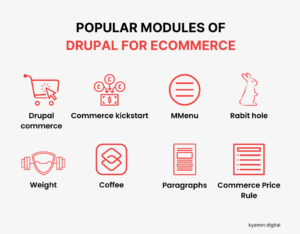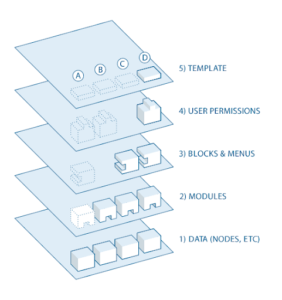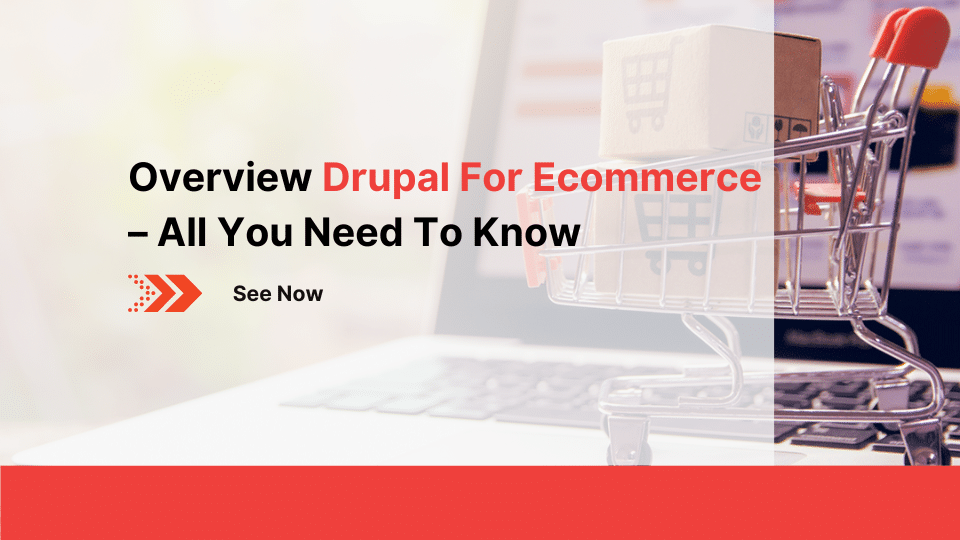Launched in 2001, Drupal is a comprehensive open-source CMS system that serves as the backbone for millions of websites around the world. Industries such as Media, Universities, Governments, Tourism, and Finance widely use Drupal for its capabilities in terms of security, versatility, and scalability.
As Drupal goes on to expand its footprint to various industry, ecommerce certainly is not left behind. In a world driven by shoppers who demand experience above anything else, Drupal gives a perfect guide for any ecommerce website, irrespective of the size of the business. It allows ambitious companies to create great experiences for customers with complex checkout workflows, and offers a large amount of integration in the payment and fulfillment channels. If you are looking around for possible options to set up an ecommerce website, this blog is the summary of everything that you need to know about Drupal for ecommerce.

1. Why Drupal for ecommerce?
There are many reasons why Drupal should be chosen for building your ecommerce website. It’s extremely beneficial for companies that have massive product catalogs, complex digital marketing, and sophisticated business rules. Companies look at Drupal as a comprehensive digital experience solution tool that unifies content, community, and commerce, onto a single platform.
The rich search interfaces, ease of content editing & modeling, detailed product pages, and safe and reliable releases, make Drupal the CMS of choice for several organizations. Drupal integrates with all the popular marketing tools to attract and serve a wide range of customers. Marketers can gather all the content into a single environment and deliver it to the end-users across several channels at the right time in the right context. It’s the building block for creating a multichannel experience. Now let’s see how it does this:

1.1. Content-driven commerce
Drupal comes with great number of dedicated editing modules that can create structured content to boost search rankings. A multilingual online store can be designed in no time and there are no limitations on the customization abilities that businesses can use to engage customers with fitting interfaces. The products can be organized in an appealing way in the store and can quickly be added, removed, or tagged without hassle.
Good content and stores will ensure SEO results and drive your sales. For example, if you are selling organic food, a touching story about the making of the product can help connect you with your customers. It’s critical for Marketers to decide on the content first and then Drupal comes with a centralized content hub to scale text, audio, and video to all devices and platforms.

1.2. Enhanced performance
Fast page loading is an essential parameter to measure the performance of any website, especially for an ecommerce site. Delayed loading leads not only reduce search rankings but also affect your conversion rates. Drupal constitutes a range of modules that collectively contribute to a swift experience:
- Blazy: speeds up the site
- CDN Module: quick integration with the content delivery network
- XML Sitemap: creates a compliant sitemap
- Pathauto: ensures search engine friendly URLs
- Meta Tag: for a default structured data
- SEO Checklist: guides on SEO excellence

1.3. Flexible integrations
To make it easy for shoppers, the website should incorporate many third-party applications. It should also enable online retailers to provide superior services through analytics. Integration with Drupal websites is straightforward, and a Drupal ecommerce module easily integrates with other apps. It facilitates communication with customer service management software, payment gateways, live chat, and email marketing tools, among other things. Your web administrator can monitor web analytics with just a few clicks thanks to the Google Analytics module. You can also easily connect your website to your social media accounts. It features up-to-date APIs that make it simple to integrate with other programs. Drupal Commerce, particularly, can benefit from the Commerce API and Commerce Cart API modules.

1.4. Headless Commerce
Headless Commerce serves as a wonderful accelerator for upmarket content-driven commerce, giving users a lot of choices when it comes to creating a pleasant purchasing experience. It is focused on the future and remains relevant. The JavaScript interface uses the REST API to communicate with Drupal’s backend. In Decoupled Drupal, the presentation layer and the e-commerce backend are also separated.
Drupal’s Headless ecommerce feature can examine the incoming device by screen time, location, or link source to show the most relevant design and info to each customer. The ease with which the desired front-end may be pushed wherever and whenever creates a deliverable omnichannel experience.

1.5. Stunning themes and templates
A website’s appearance is the first opportunity to attract visitors. Drupal provides a wide range of best-in-class themes and templates for e-commerce websites and some of them are listed below:
- Estore for easy installation
- Flexicart global theme for quick selling
- Belgrade, the Drupal Commerce template for business website
- SShop for inbuilt Drupal Commerce support
- Wosh for an amazing shopping experience
- Martis for modern design and flexibility
- Jango, the multi-purpose theme to kickstart the online shop journey
- Edupia for education business in need of e-Commerce extension
1.6. Mobile-first
Ecommerce merchants can easily enhance their revenue by placing their stores in the hands of their customers, allowing them to buy at any time and from any location. Launching a mobile app that is easy for your clients to use is the best strategy.
For each ecommerce site, mobile compatibility has become an essential element. Everything in today’s world has to be mobile-friendly. Drupal websites impress clients not only with their aesthetics but also with their mobile-friendly design. Drupal websites are mobile and tablet-ready.

2. Some of the popular Drupal ecommerce modules
Drupal has a bunch of powerful modules that marketers and administrators use as tools, not just for generating revenue through the online stores, but also to keep up security and adaptability. Listed below are some essential ecommerce modules from Drupal.

- Drupal Commerce: This module fulfills the traditional ecommerce needs with the likes of the shopping cart, product catalog management, etc. It’s unstoppable in terms of customization and scalability, hence making it suitable for businesses of all sizes. It brings your website to the ecommerce world!
- Commerce Kickstart: It speeds up the process of building online stores through its inbuilt configuration and modules – just fast and simple!
- MMenu: A highly responsive module that eases the process of setting up a mobile off-screen menu. Besides featuring touch screen support, it’s inexpensive and easy to use.
- Rabbit Hole: A highly resourceful module that deals with the issues of making the nodes accessible individually through a set of taxonomy terms in the content. It’s just magical when the site gets indexed by Google.
- Weight: A very useful module for organizing and arranging the content based on a specific order. Content can be collated in Drupal nodes and can be listed in a weighted fashion.
- Coffee: An easy keyboard shortcut which makes admin area navigation possible, saving time when searching for the desired page since it’s much faster than using a mouse.
- Paragraphs: Without technical expertise, the paragraphs module allows the synchronization of content using predefined components. New content can also be added in individual paragraphs.
- Commerce Price Rule: Automatically sets-up variable pricing on the site for each customer, based on the set of conditions prescribed.
Besides what is mentioned above, other ecommerce useful modules include Payment Gateway, Commerce Shipping, Currency Exchange, Invoice, Fieldgroup, Ubercart, Role Expire, Google Analytics, Stage File Proxy, and Entity Browser.
3. Implementing Drupal for ecommerce
Drupal is a free and 100% open-source software without licensing costs, and one can simply start coding right away. The below image from drupal.org shows how the information flows between the 5 layers of the Drupal system.

Source: Drupal.org
If you want to build an online store using Drupal without a Developer, then start by downloading the Drupal core from the official website or using the composer package manager. Drupal.org events are very resourceful, with experts sharing their views and experiences for those aspiring to build online shops using Drupal.
4. Bundling a Drupal for ecommerce site
Building a custom ecommerce Drupal site is always challenging, especially when implementing new features and integrating with the desired third-party platforms. In reality, it’s just not easy to roll out a professional-looking environment without the help of a suitable partner. While millions of environments are built around Drupal and there is an established community of trusted platform specialists, integrators, training, and consulting services, you must understand that it’s not about technology, it’s about business needs.
A reliable Drupal development company is all that you need and that’s when you should think of Kyanon Digital. For us, dealing with Drupal is a daily affair and we know how to make your Drupal ecommerce sites look their best. We are keen to understand your needs so if you are intrigued, just drop us a line!
FAQs
Drupal is a powerful and flexible open-source CMS that’s particularly well-suited for eCommerce businesses with:
- Large product catalogs: Drupal can easily handle thousands of products and complex product variations.
- Sophisticated business rules: Drupal allows you to create custom pricing rules, promotions, and checkout workflows.
- High security needs: Drupal has a strong security record and is trusted by many large organizations.
- Content-rich websites: Drupal excels at managing and delivering content, which is crucial for SEO and engaging customers.
- Content-driven commerce: Drupal allows you to seamlessly integrate content and commerce, creating engaging shopping experiences.
- Enhanced performance: Drupal offers various modules and tools to optimize website speed and performance.
- Flexible integrations: Drupal easily integrates with third-party services like payment gateways, CRM systems, and marketing automation tools.
- Headless commerce: Drupal supports headless commerce, providing flexibility in designing and delivering unique customer experiences across different channels.
- Mobile-first approach: Drupal websites are responsive and mobile-friendly, ensuring a seamless experience for customers on any device.
- Drupal Commerce: This core module provides the foundation for building an online store, including shopping cart functionality, product management, and order processing.
- Commerce Kickstart: This module provides a pre-configured eCommerce website with essential features to get you started quickly.
- Other useful modules: There are many other modules available for payment gateways, shipping, currency exchange, invoicing, and more.



